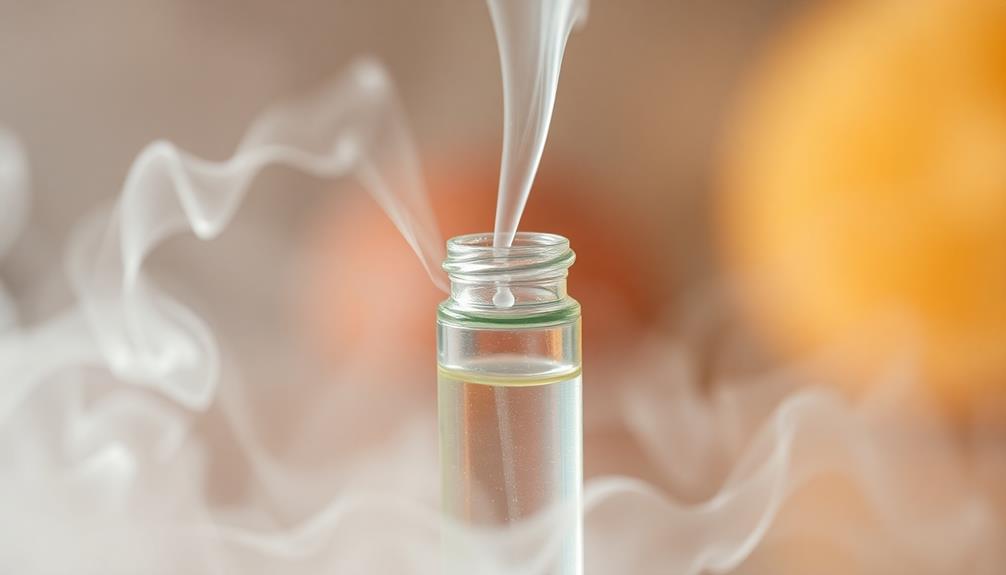What you eat really does affect your urine's smell. Foods like asparagus and garlic break down into sulfur compounds, giving your pee a strong odor. If you've had fish, you might notice a fishy smell due to trimethylamine from choline-rich foods. Even your hydration level plays a role; dehydrated urine gets more concentrated and its odors amplify. Sweet-smelling pee could indicate a high-protein diet or even diabetes. If you're curious about the specifics of how different foods influence your urine, there's plenty more to explore regarding the connection between diet and body odors.
Key Takeaways
- Certain foods, like asparagus and garlic, contain compounds that metabolize into sulfur, altering urine odor significantly.
- Choline-rich foods, such as fish and eggs, can produce a fishy smell due to trimethylamine breakdown.
- High-protein diets can lead to sweet-smelling urine because of increased ketone production.
- Hydration levels affect urine concentration; dehydration intensifies odors from food consumption.
- Medical conditions and medications can also result in changes to urine odor, indicating potential health issues.
Introduction

When you sit down to enjoy a meal, you might not think about how your food choices can affect your body's chemistry—especially the smell of your urine. Certain foods can cause noticeable changes in odor, making it a topic worth considering. For instance, asparagus contains asparagusic acid, which breaks down into sulfur compounds that create a distinct smell in your urine. Similarly, garlic and onions also contain sulfur compounds, leading to strong odors after digestion.
If you're following high-protein diets, you might notice sweet-smelling urine. This happens because your body produces more ketones, especially if you have diabetes. Foods rich in choline, like eggs and fish, can contribute to a fishy odor due to the breakdown of trimethylamine during digestion.
To help manage these odors, remember to drink plenty of water. Staying hydrated dilutes your urine, minimizing the impact of dietary odors. On the other hand, dehydration can concentrate these smells, making them much more pronounced. So, the next time you eat, consider how your meal may influence not just your taste buds but also the way your urine smells!
Description of the Smell

The smell of urine can be quite telling, revealing the impact of your recent meals. If you've just indulged in asparagus, you might notice a strong, distinct smell in your urine. This happens because asparagusic acid breaks down into sulfur-containing byproducts, creating that unmistakable odor. Garlic and onions can also contribute to the overall scent, thanks to their sulfur compounds.
You might become aware of a fishy smell in your urine after consuming foods rich in choline, like fish, eggs, or liver. This occurs when your body struggles to break down trimethylamine effectively, leading it to be excreted in your urine.
Dehydration plays a role too; when you're not drinking enough water, your urine becomes concentrated, intensifying any dietary odors. Spices, like curry, and certain meats can leave their mark, reflecting the unique compounds broken down during digestion. Overall, the distinct odors in your urine offer a fascinating glimpse into the foods you eat, reminding you how closely your diet connects to your body's processes.
Source and Composition

Urine's smell comes primarily from the breakdown of various compounds found in the foods you eat. When you consume certain foods, they release specific compounds that your body metabolizes, leading to distinctive odors in your urine. For instance, asparagus contains asparagusic acid, which, when metabolized, produces sulfur-containing compounds, resulting in that unique smell. Similarly, foods rich in choline, like eggs and fish, generate trimethylamine during digestion, creating a fishy odor in your urine.
Garlic and onions also contribute strong smells due to their sulfur compounds. These odors can be quite pronounced, especially if you're dehydrated. The concentration of your urine significantly affects the intensity of these smells; the less hydrated you are, the more concentrated your urine becomes, amplifying the odor of food-derived compounds.
Typical Scenarios or Environments

Certain eating environments can significantly impact how your urine smells after a meal. For instance, if you indulge in a dinner rich in asparagus, garlic, or onions, you might notice a distinct odor in your pee shortly afterward. These foods contain sulfur compounds that break down in your body, leading to noticeable changes in urine smell. Similarly, high-choline foods like eggs and fish can create a fishy odor as they metabolize, thanks to the release of trimethylamine.
The environment you dine in can also affect your hydration levels. If you're at a restaurant and forget to drink enough water, dehydration might concentrate your urine, intensifying any odors. Additionally, if you take dietary supplements high in B vitamins, you may encounter a strong smell in your urine, reflecting how your body processes these nutrients.
Timing is essential, too. Strong odors can appear within hours after consuming these foods, emphasizing the direct relationship between your diet and urine smell. So, whether you're enjoying a casual meal at home or a lavish dinner out, be mindful of the foods you eat and their potential impact on your urine's odor.
Emotional or Cultural Associations

Food often carries emotional and cultural weight, shaping how we perceive its effects on our bodies. When you consume certain foods, like garlic or spicy dishes, you might become hyper-aware of how they affect your urine odor. This heightened awareness often stems from cultural associations that link these foods to strong smells, creating a stigma around their consumption.
Psychological factors play a significant role in this perception. Your past experiences and cultural teachings about food and hygiene can influence your emotional response to urine odors. If you've grown up in a community where certain dietary choices are frowned upon, you might feel embarrassed or self-conscious about the resulting smells.
This interplay between food choices and societal norms creates complex relationships, where you might associate particular odors with negative or positive emotions. For instance, enjoying a flavorful meal might bring you joy, but the subsequent urine odor could lead to feelings of shame. Recognizing these emotional and cultural associations can help you navigate your perceptions of body odors and their connection to your dietary habits, ultimately fostering a healthier relationship with food.
Health or Safety Considerations

Your dietary choices can significantly impact not just the smell of your urine but also your overall health. Certain foods, like asparagus, garlic, and onions, can cause your urine to smell bad due to specific compounds they contain. Additionally, high-choline foods, such as eggs and fish, might lead to a fishy odor as your body processes trimethylamine.
It's essential to consider how dehydration can concentrate waste products in your urine, intensifying these odors. If you're not drinking enough water, you may notice your urine smells stronger or more pungent.
Medications and supplements, especially those rich in B vitamins, can also alter your urine's smell, reflecting changes in your body chemistry. While occasional changes in odor are usually harmless, you should pay attention to persistent shifts. If you notice other symptoms, like pain or cloudy urine, it could indicate underlying health issues that require medical attention. Monitoring your water intake and being mindful of common urinary odorants in your diet can help you maintain better health and prevent potential problems linked to urine smells. Furthermore, maintaining a balanced diet is crucial for overall health and can influence various bodily functions, including those related to urine odor.
Final Thoughts

Urine odor can reveal a lot about your health and dietary habits. When you eat certain foods like garlic or asparagus, compounds from these items can create distinct urine smells. If you notice unusual urine odors, it could be a sign of what you've consumed recently. Remember, dehydration can also concentrate your urine, intensifying the smell of those foods.
B vitamins found in supplements may alter your urine odor as well, reflecting changes in your diet. It's essential to be aware of how your eating habits impact your body, as some individuals may not even detect specific odors due to genetic factors.
Staying hydrated is crucial in managing these odors. By drinking enough water, you can dilute your urine, making those smells less pronounced. This also supports overall health and wellbeing.
Incorporating dietary awareness into your daily routine can help you understand how different foods affect your urine. By paying attention to these signals, you can make informed choices about your diet and hydration to maintain optimal health. So, next time you notice a strong urine smell, consider what you've eaten and how it might be impacting you.
Frequently Asked Questions
Is It Normal for Urine to Smell Like the Food You Ate?
Yes, it's completely normal for your urine to smell like the food you ate. Certain foods contain compounds that get metabolized and excreted, altering the scent of your urine. For example, asparagus can create a sulfurous odor, while garlic and onions might add a strong pungent smell. If you're dehydrated, these odors can become even more pronounced. Staying hydrated helps dilute the smell, so drink plenty of water!
How Do I Stop My Pee From Smelling Like Food?
To stop your pee from smelling like food, start by drinking more water to dilute your urine. This can help minimize strong odors. Try cutting back on foods known for strong smells, like asparagus and garlic. Incorporate more fruits and veggies into your diet to balance things out. Lastly, consider reducing high-protein and choline-rich foods. If the odor persists, it's a good idea to talk to a healthcare provider.
What Does Unhealthy Urine Smell Like?
Unhealthy urine typically has a strong, foul smell that can be quite alarming. You might notice an ammonia-like scent if you're dehydrated, as concentrated waste intensifies the odor. If your urine smells sweet or fruity, it could indicate elevated blood sugar levels, which might suggest diabetes. Additionally, a persistent, unpleasant smell, especially with other symptoms like pain or blood, signals that you should seek medical attention to rule out infections or health issues.
Why Does My Pee Smell Like Crab Legs After I Eat Them?
When you eat crab legs, your body breaks down compounds like choline and trimethylamine, which can result in a distinct seafood smell in your urine. If you're dehydrated, the concentration of waste products increases, making the odor even stronger. Individual differences in your metabolism and gut bacteria also play a role, so not everyone experiences the same intensity of smell. Cooking methods and seasonings can further influence how your urine smells afterward.









